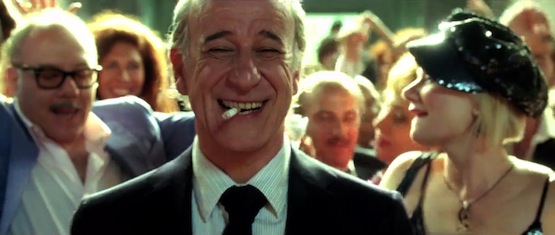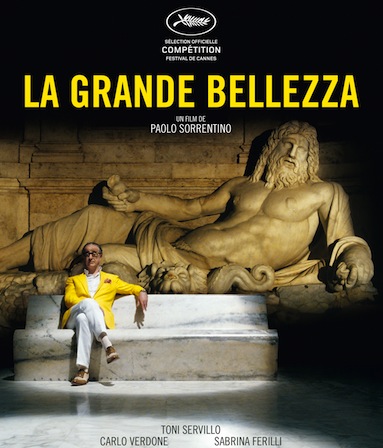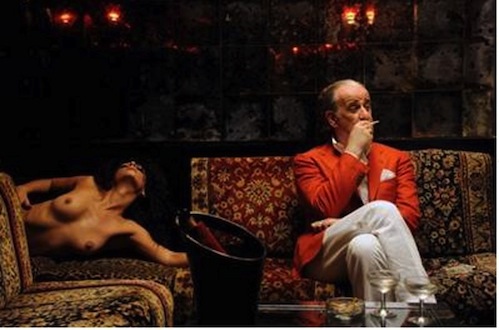 During its brief two and a half week run at the Tivoli in Westport, Paolo Sorrentino’s masterpiece got scant notice here locally. (The Star ran a perfunctory, syndicated review by the Minneapolis Star Tribune’s Colin Covert on the day before the film opened.)
During its brief two and a half week run at the Tivoli in Westport, Paolo Sorrentino’s masterpiece got scant notice here locally. (The Star ran a perfunctory, syndicated review by the Minneapolis Star Tribune’s Colin Covert on the day before the film opened.)
Like most other reviews, the aptly named Mr. Covert’s piece noted the obvious parallels between this movie and Frederico Fellini’s classic, “La Dolce Vita.” Both works involve an episodic descent into the jet-set underworld of Rome. (Fellini’s guide to that underworld was the matchless Marcello Mastroianni, Sorrentino’s, the equally sublime Toni Servillo, who has appeared in other films by that director.) Both portray the frantic energy that goes into the pursuit of pleasure at all costs and both show the disillusionment and despair that inevitably follows. (With due allowance for some pretty good parties along the way!)
There the resemblance ends because Sorrentino’s movie has clear clues that redemption is possible, that everyone who takes the trouble to exercise their imagination and lay claim to their cultural heritage will be richly rewarded and their way along life’s path made easier.
The Great Beauty’s protagonist, an aging writer/journalist named Jep Gambardella, is first seen at his sixty-fifth birthday party. (The New York Post’s John Podhoretz calls his home overlooking the Colosseum “the world’s greatest apartment”!) Amidst the hilarity and sensual excess, we as viewers can see the boredom and fatigue that have overtaken the revelers, a mood that becomes palpable shortly thereafter when Jep tires of being baited by a rich Marxist poseur and tells her off in no uncertain fashion. The same impatience with pretension and self-indulgence is on display when Jep conducts an interview for his magazine with an equally tiresome “performance” artist (‘Talia Concept’ by name!).
 We as Americans don’t know it, but there is a tradition of take-no-prisoners interviews in Italian journalism, where politicians of right and left can be scourged by the same interviewer. Nor should we be expected to know that the pretentious artists and intellectuals pilloried in the movie have their real life counterparts recognizable by Italian audiences.
We as Americans don’t know it, but there is a tradition of take-no-prisoners interviews in Italian journalism, where politicians of right and left can be scourged by the same interviewer. Nor should we be expected to know that the pretentious artists and intellectuals pilloried in the movie have their real life counterparts recognizable by Italian audiences.
What is less excusable for American film critics is to miss the broader significance of the movie. Not only are there things that happen to our hero that more than suggest that this is not just another exercise in world-weary nihilism, we have interviews with director Sorrentino that tell us what he meant to convey.
Sorrentino says expressly that the Mother Theresa-like character, “The Saint” as she’s referred to in the movie, is meant to inspire us with the simplicity of her faith. At first Jep and his sophisticate friends are cynical and mocking, if only in an understated way, of the cult-like devotion she has inspired. (An attitude that seems confirmed by the way her handlers exploit her for their own gain!) Later Jep witnesses her mystical powers first hand and we in the audience see the nun laboriously and painfully doing penance, with no one else present (and thus no obvious PR or publicity advantage).
By the same token, all the other reviewers miss the significance of the character Cardinal Belluci, an Italian prelate one of Jep’s friends tells him is on the short list to be the next Pope. When the friend tells Jep, sotta voce, that the Cardinal is also the foremost exorcist of evil spirits in Europe, Jep is incredulous. The friend assures him that; “I never joke about the Devil!”
We initially share Jep’s skepticism, particularly because the worldly Cardinal (he has a Bentley) seems more intent on sharing his favorite gourmet recipes than The Gospel with the faithful. In one of the later scenes in the movie; however, Jep gets up the nerve to ask Belluci if it is true about his metaphysical powers. The heretofore comic character says something softly in Latin to Jep which we cannot hear, closing with the blessing, “In nomine patris, et fillii, et spiritus sancti.”
 We know that Jep now realizes that evil is indeed no joking matter.
We know that Jep now realizes that evil is indeed no joking matter.
The other point that eludes virtually every reviewer is the respect Jep feels for the life of the mind. It’s precisely because it is so important in shaping our imagination and response to the world that our culture must be reclaimed from intellectual fraud and pretension. The movie begins with a quote from the French author Louis-Ferdinand Celine. There are references to Flaubert, Turgenev, Moravia,Proust and Chekov . None is forced; all are in the right context. (A sharp-eyed Italian critic noticed Jep’s library, which includes many books by a serious scholarly publisher.)
The turning point in the hero’s quest is a nocturnal journey he goes on with a young woman who is the daughter of an old friend. They meet a fellow guest at one of the numerous high-end soirees portrayed in the movie who takes them on an all night pilgrimage to see private treasures in palaces, churches, museums, etc. He has a carrying case of elaborately crafted antique keys that open the doors, literally, to this hidden world to Jep and his awe-struck lover. They end up walking the streets of Rome in the grey dawn but one senses they have undergone a spiritual awakening, even though they have had a sleepless night.
The real guidepost that Sorrentino specifically relies on is Dante. Like the author of the Inferno, Jep has found himself at the mid-point of the path of life in a wood so dark that the way ahead is obscured.
Thanks to this stunningly beautiful movie, we can all see the way.










I guess I’ll have to wait for the blu-ray of it.
1. I am much like the Cardinal; I long for a Bentley Turbo R.
2. This is the first story in the history of ever making a reference to Dante, outside of the subliminal one when a Harley comment makes you feel like you’re in the 7th level of hell before you’re done reading it.
Thank you for challenging us, yet again.